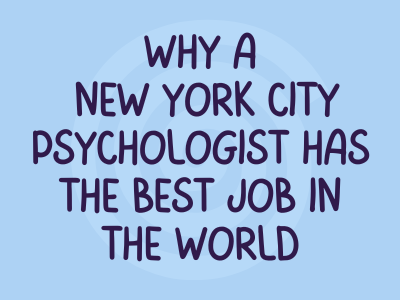
Why a New York City Psychologist Has the Best Job in the World
(As seen on Huff Post)
If you’re considering a career as a psychologist AND you plan to practice in New York City, you’re in luck.
Serving the mental health needs of New Yorkers as a psychologist in private practice is more than just great…it’s the most rewarding career path available. Of course, I’m just a tiny bit biased, but I stand by my assertion and you’ll learn why I feel so strongly about it.
Keep in mind that I’m generally referring to what it’s like to be a New York City psychologist in private practice as opposed to working in a hospital, school or clinic setting. You can also have a rewarding career as a psychologist outside of the private practice setting, but running your own show takes the experience a hundred levels higher. And even if you want to be in private practice, you almost always have to train and work in other settings before you can practice independently
All I will say to qualify my bold statement is that a career as a psychologist can only be so profoundly amazing if the following are true:
- You can handle the uncertainty of lacking a regular, predictable paycheck.
- You don’t worship money.
- You have exceptional listening skills, you tend to root for the underdog, you have the humility to take responsibility for your actions in interpersonal conflict and you don’t unravel when you hear about extreme mental suffering.
Yes, this is a gross oversimplification of what makes a solid psychologist, but it will have to do for now.
The Life of the NYC Psychologist
- First and foremost, you get to meet the most intelligent, dynamic and talented group of people in the world. Can you imagine how enjoyable it would be to spend your day enhancing the lives of the movers and shakers of the world? It’s wildly exciting to help younger generations who have the drive, talent, creativity and mental ability to change the world. A typical day may involve working with an ambitious student, then a programmer, then a talented finance or professional, then an entertainer, then a C-suite executive. It’s amazing! I learn as much from my patients as they do from me.
- You learn how to mix art with science to enhance the lives of people who are the world’s best artists and scientists. The best therapy is one that mixes objectively proven techniques with artful, interpersonal maneuvers. Psychologists, especially skilled ones, take mental health care to the next level by offering much than what a book or manual can teach. They mix art into their approach, which adds an intangible element that promotes personal transformation.
- You feel like you’re making a difference in the world on a daily basis. Since New York attracts such a unique type of individual, it can feel like you’re having a profound effect on society by improving the lives of people who make things happen for the world. As your skillset grows, so will your ability to create significant changes for your patients, which in turn, will make them more effective in their influence on the world.
- You become an expert in New York City culture without trying. Imagine being constantly taught about the subtleties of city life, the latest trends, memes, metaphors, fashion, art and everything that makes NYC so unique. It gives you the sense that you have your finger on the pulse of the Center of the Universe, the world’s largest think tank. Clients will incorporate their vast array of cultural opportunities into their therapy. For example, you will get to talk with clients about Hamilton after they see the show, or an art installation, gala or tech convention.
- Investing in self-improvement becomes a thunderclap of wellness that spreads across the city. If you read about an interesting concept, you’re suddenly equipped with a powerful metaphor to use with certain clients. Take on the task of reading a self-help book or attending a seminar and your clients will indirectly benefit from what you personally reap.
- You make your own hours which gives you a invigorating sense of freedom.While everyone else is counting vacation days, imprisoned within a cube city and reporting to a boss, you get to do whatever you feel like. Even with a full roster of patients, there’s still tons of time to play in the city. This can be problematic if you’re undisciplined or you crave the structure offered by a regular paycheck. To be honest, I would give up the predictability of a regular paycheck in a heartbeat for the freedom to walk outside on a two-hour break between sessions to sit in a wonderful coffee shop and write a blog post, take an hour-long stroll and soak in the city’s spirit and beauty, schmooze with New Yorkers or casually browse through a magic shop or a used book store.
- You’re exposed to the most diverse group of people and ideas on the planet. In a single day, you might work with people from six different countries, or help someone manage the stress of the inner city right after assisting someone with managing the stress of running a large company. You get to talk with people with high aspirations, people from backgrounds unlike your own who care about the world and want to make it a better place.
